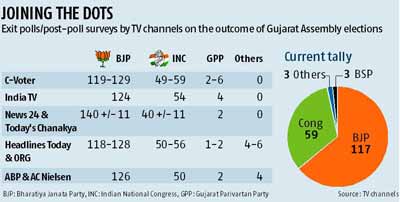As the Lok sabha Elections have finally wound up on 12th may the exit polls are making the headlines round of various news channels and newspapers. This Election was for the post of Prime Minister in India which plays a major role in a democratic country like ours.
What Is An Exit Poll
Exit polls are a sample of poll taken of a number of voters as they leave a polling place. It is used especially to predict the outcome of an election.
Exit Polls Are They Necessary?
Exit polls have to be analyzed separately in order to know their pros and cons. The Election Commission has put a ban on exit polls until 48 hours of the last hour of voting. It is more to satisfy the curiosity of the voter and the political parties rather than influence a voter. Inappropriate and irrelevant sample sizes, not considering the demography of the constituency exactly and a basic 3% error when extrapolated to a larger population are the reasons why they have failed previously. Certain regulations have to be enforced to make these polls unbiased but a ban on them is definitely not the solution.
Lok Sabha Elections 2014 And Exit Polls
Most Lok Sabha 2014 exit polls signaled the chances of Narendra Modi taking power in the world’s second-most populous country. According to six exit polls Modi’s Bharatiya Janata Party and its allies will win 249 to 340 seats, with 272 needed for a majority. The Congress party and its allies, in power for the past decade, are projected to win 70 to 148 seats. The polls, which have overestimated the BJP’s strength in the past two national elections, could further boost Indian stocks and the rupee as investors bet that Modi will revive growth in Asia’s third-biggest economy. In the 2009 election, the Congress alliance won 260 seats and the BJP group took 160. While exit polls in India can be unreliable, the rush of opinion polls expected Monday could give some important clues about the future of the world’s largest democracy. The official results will not be announced until May 16.
Stocks Gain
The stock market has proven to be very volatile after elections in the past. Stocks soared on the results of the last general election in 2009 and tumbled on the results of 2004. Investors will look at the exit poll totals for the BJP. Good indications it will get 272 seats or more, giving the party a majority in Parliament, could trigger a further rally in stock prices of 5% or more. The BJP bloc would win 261 to 283 seats, according to an India Today exit poll, while the Congress-led alliance would win 110 to 120 seats.
Poll Accuracy
A poll by Today’s Chanakya showed the BJP and its allies winning 340 seats, compared with 70 seats for the Congress group. An ABP News-Nielsen exit poll forecast Modi’s group would win 281 seats, compared with 97 for Congress and its allies. A Times Now-ORG India exit poll gave 249 to the BJP-led alliance, with 148 going to the ruling party’s group. CNN-IBN said the BJP group would win 270 to 282 seats, with the Congress-led alliance taking 92 to 102 seats.
Economic Record
Modi has campaigned on his record in Gujarat, which has outpaced the national economic growth rate in 11 of the past 12 financial years for which data is available. His main opponent is Rahul Gandhi, the 43-year-old scion of India’s foremost political dynasty and vice president of Congress, he has spent on programs ranging from cheap food to guaranteed work in rural areas.
Market Moves
In the last two elections, exit polls have overestimated the strength of the BJP and its allies- by about 30 seats in 2009 and as many as 70 seats in 2004. Congress’s surprise win to take power a decade ago led to the biggest one-day sell-off of stocks in more than four years, while its re-election in 2009 boosted the stock market by a record 17 percent in the next trading day. Hence Exit Polls have played a major role in Lok Sabha Elections 2014 but the final results will be declared on May 16th 2014 and we will have to wait until then to find out who will lead our country for the next five years.

Comment Policy [Please read this before posting your comments]: Only use your real name. Your words are your own, so be nice and helpful if you can. Please, do not share any personal information in your comments. For further details, please read our Comments Policy available over here.